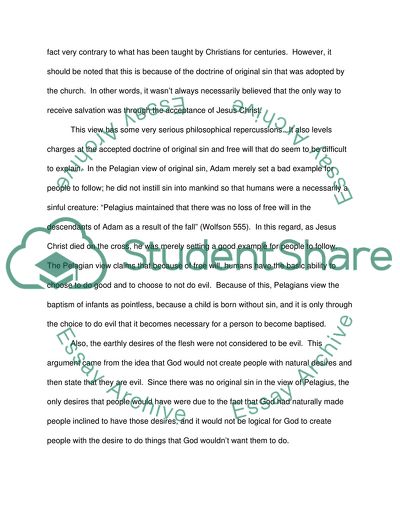Cite this document
(According to Pelagius, God has made humanity, and knows precisely what Essay, n.d.)
According to Pelagius, God has made humanity, and knows precisely what Essay. https://studentshare.org/religion-and-theology/1714222-according-to-pelagius-god-has-made-humanity-and-knows-precisely-what-it-is-capable-of-doing-compare-pelagius-statement-with-other-understandings-of-human-condition-and-offer-an-evaluation-with-regard-to-the-christian-understanding-of-free-will
According to Pelagius, God has made humanity, and knows precisely what Essay. https://studentshare.org/religion-and-theology/1714222-according-to-pelagius-god-has-made-humanity-and-knows-precisely-what-it-is-capable-of-doing-compare-pelagius-statement-with-other-understandings-of-human-condition-and-offer-an-evaluation-with-regard-to-the-christian-understanding-of-free-will
(According to Pelagius, God Has Made Humanity, and Knows Precisely What Essay)
According to Pelagius, God Has Made Humanity, and Knows Precisely What Essay. https://studentshare.org/religion-and-theology/1714222-according-to-pelagius-god-has-made-humanity-and-knows-precisely-what-it-is-capable-of-doing-compare-pelagius-statement-with-other-understandings-of-human-condition-and-offer-an-evaluation-with-regard-to-the-christian-understanding-of-free-will.
According to Pelagius, God Has Made Humanity, and Knows Precisely What Essay. https://studentshare.org/religion-and-theology/1714222-according-to-pelagius-god-has-made-humanity-and-knows-precisely-what-it-is-capable-of-doing-compare-pelagius-statement-with-other-understandings-of-human-condition-and-offer-an-evaluation-with-regard-to-the-christian-understanding-of-free-will.
“According to Pelagius, God Has Made Humanity, and Knows Precisely What Essay”. https://studentshare.org/religion-and-theology/1714222-according-to-pelagius-god-has-made-humanity-and-knows-precisely-what-it-is-capable-of-doing-compare-pelagius-statement-with-other-understandings-of-human-condition-and-offer-an-evaluation-with-regard-to-the-christian-understanding-of-free-will.


